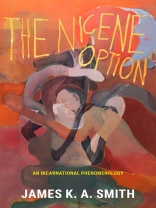Christian philosophy and philosophy of religion tend to be dominated by analytic approaches, which have brought a valuable logical rigor to the discussion of matters of belief. However, the perspectives of continental philosophy–in particular, the continental emphasis on embodied forms of knowing–still have much to offer to the conversation and our understanding of what it means to be both rational and faithful in a postmodern world.
The Nicene Option represents the full sweep of James K. A. Smith’s work in continental philosophy of religion over the past twenty years. Animated by the conviction that a philosophy of religion needs to be philosophical reflection on the practice of religion, as a ‘form of life’ (as Wittgenstein would say), this book makes the case for the distinct contribution that phenomenology–as a philosophy of experience–can make to philosophy of religion and Christian philosophy. Engaging a range of philosophers in this tradition, including Edmund Husserl, Martin Heidegger, Jacques Derrida, Emmanuel Levinas, Maurice Merleau-Ponty, Jean-Luc Marion, Richard Rorty, and Charles Taylor, Smith’s constructive proposal coheres around what he describes as ‘the logic of incarnation, ‘ a ‘Nicene option’ in contemporary philosophy of religion. By grounding philosophy of religion in the doctrinal heart of Christian confession, Smith gestures toward a uniquely robust Christian philosophy.
Besides issuing a clarion call for the renaissance of continental philosophy of religion, The Nicene Option also offers a glimpse behind the scholarly curtain for a wider audience of readers familiar with Smith’s popular works such as Who’s Afraid of Postmodernism?, Desiring the Kingdom, Imagining the Kingdom, and You Are What You Love–all of which are tacitly informed by the phenomenological approach articulated in this book. As an extended footnote to those works–which for many readers have been gateways to philosophy– The Nicene Option presents an invitation to a new depth of reflection.
İçerik tablosu
Introduction: God on the Left Bank? Prospects for a Continental Philosophy of Religion
I Outline of an Incarnational Continental Philosophy of Religion
1 The Philosophy of Religion Takes Practice: A Methodological Manifesto
2 Secular Liturgies: Prospects for a ‘Post-Secular’ Study of Religion
3 Continental Philosophy of Religion: Prescriptions for a Healthy Subdiscipline
4 A Logic of Incarnation: The Nicene Option in Continental Philosophy of Religion
II Derrida, Marion, and the Possibility of a Christian Phenomenology
5 Determined Violence: Derrida’s Structural Religion
6 Re-Kanting Postmodernism? Derrida’s Religion within the Limits of Reason Alone
7 Determined Hope: A Phenomenology of Christian Expectation
8 Beyond Epistemology: Derrida and the Limits of the ‘Limits of Knowledge’
9 A Principle of Incarnation in Derrida’s (Theologische?) Jugendschriften: Towards a Confessional Theology
10 Deconstruction–an Augustinian Science?
11 Picturing Revelation: Idolatry and the Aesthetic in Marion and Rosenzweig
12 The Call as Gift: The Subject’s Donation in Marion and Levinas
Afterword: An Incarnational Phenomenology
Yazar hakkında
James K. A. Smith is Professor of Philosophy at Calvin University and serves as editor in chief of Image, a literary quarterly at the intersection of art, faith, and mystery. He is the award-winning author of more than twenty books, including Who’s Afraid of Postmodernism?, How (Not) to Be Secular, You Are What You Love, and On the Road with Saint Augustine.







![Örtmek Brian Schrag & Julisa Rowe: Community Arts for God's Purposes [Chinese] 貼近神心意的社群藝術 Örtmek Brian Schrag & Julisa Rowe: Community Arts for God's Purposes [Chinese] 貼近神心意的社群藝術](https://static.worldofdigitals.com/thumb_webp/740/9781645083740.webp)




